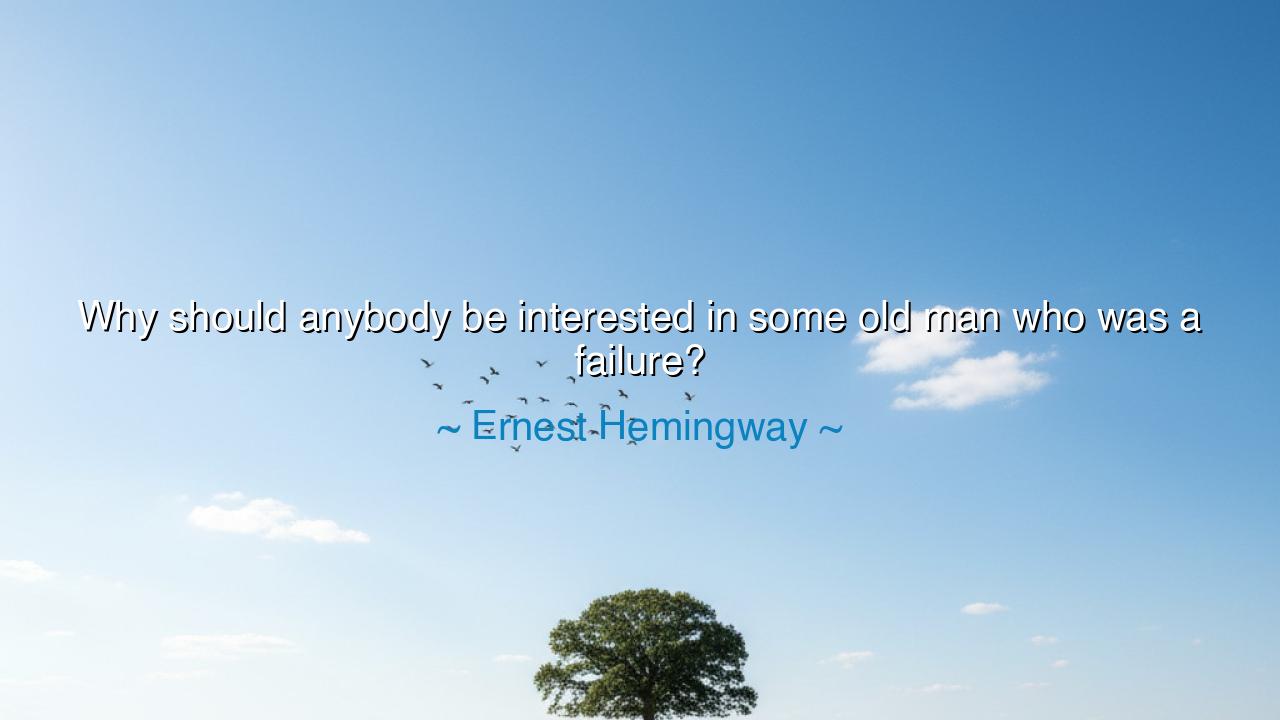
Why should anybody be interested in some old man who was a






Host: The room felt still, the air thick with the kind of quiet that invites deeper thoughts. Jack sat by the window, his fingers idly tapping on the armrest, his gaze fixed on the city lights that had just begun to sparkle in the distance. Jeeny sat across from him, a cup of tea in hand, her expression thoughtful. There was a subtle tension in the air, an unspoken curiosity that seemed to be waiting for the right words to break the silence.
Host: Ernest Hemingway’s words broke the quiet like a sharp question: “Why should anybody be interested in some old man who was a failure?” The simplicity of the statement felt like an invitation to dive into the complexities of legacy, success, and failure—a reminder that how we define ourselves often changes with age, with time, and with the perspective of those around us. Jack, always the one to dissect ideas, was the first to speak.
Jack: His voice was reflective, almost dismissive: “That’s a tough question, isn’t it? Why should anyone care about someone who’s failed? But then, maybe that’s the thing—failure doesn’t define someone. At least, it shouldn’t. If Hemingway was talking about someone who was old and had failed in some way, it’s easy to see why people might look at them as irrelevant. But I think the real question is whether failure really has the power to erase everything else a person has done.”
Jeeny: Her expression softened, her voice gentle but filled with quiet understanding: “I think Hemingway’s tapping into a larger truth here. We live in a world that values success so much. We’re taught to measure people by their achievements, by their wins, by how far they’ve gotten in their careers or their lives. But failure doesn’t mean someone is done. It doesn’t mean they no longer have value. Sometimes, failure is part of the journey, a part of what makes people human. And maybe what Hemingway is suggesting is that we often forget the story of a person once they’ve failed or once their success no longer defines them.”
Host: The room seemed to grow a little heavier, as if the weight of her words was slowly settling between them. The idea that failure could overshadow a life’s full story, that it could erase the complexity of a person’s journey, felt like a subtle truth. Jack’s usual skepticism seemed to soften as he thought about how easily people could be defined by their worst moments, their hardest failures, rather than by their entire existence.
Jack: His voice, now quieter, almost reflective, seemed to echo a shift in his thinking: “Maybe that’s it. We focus too much on success, on the idea that people are only worth what they’ve achieved or how much they’ve accomplished. But real value comes from who someone is, not just what they’ve done. Failure doesn’t erase a person’s character, their journey, or their experiences. The people we look up to often have the most complicated stories, full of setbacks, struggles, and failures. Those moments are just a part of their story, not the end of it.”
Jeeny: She smiled softly, her voice reassuring: “Exactly. Failure is human, and it’s often the moments of failure that teach us the most. The best stories, the ones that resonate the most, are often about people who fell, who struggled, but didn’t stay down. It’s about the recovery, the lessons learned, and how they keep going. When you look at someone who’s failed, you don’t see the whole person unless you understand the full picture—the journey, the growth, and the heart behind it.”
Host: The weight of their conversation seemed to linger, not in a negative way, but in the quiet understanding that failure wasn’t the end of a person’s story, but a part of it. The world often valued success and achievement, but the full depth of a person’s life—what made them truly worthy of attention—came from everything they were, not just what they’d achieved. Jack and Jeeny sat together, realizing that even in failure, there was a story worth telling, a lesson worth learning.
Jack: His voice, almost reassured, seemed to reflect the change in his thinking: “Maybe it’s not about being a success or a failure. Maybe it’s about who we are, what we’ve lived through, and how we carry it all. That’s what makes someone worth paying attention to, not whether they’ve always succeeded.”
Jeeny: She nodded, her smile warm, her voice affirming: “Exactly. It’s the whole person, the whole journey, not just the final result. And sometimes, it’s the failures that tell us the most about who someone really is.”
Host: The night had fully taken over outside, but inside, the room was filled with a quiet understanding—that failure, while often seen as something to be avoided or forgotten, was not the end of a story. It was just a chapter, a part of the broader picture that made up a person’s life. Jack and Jeeny sat in that realization, knowing that everyone had a story worth listening to, even if their failures were a part of it. Sometimes, the most powerful stories came not from success, but from the moments of struggle and resilience that shaped who we are.






AAdministratorAdministrator
Welcome, honored guests. Please leave a comment, we will respond soon